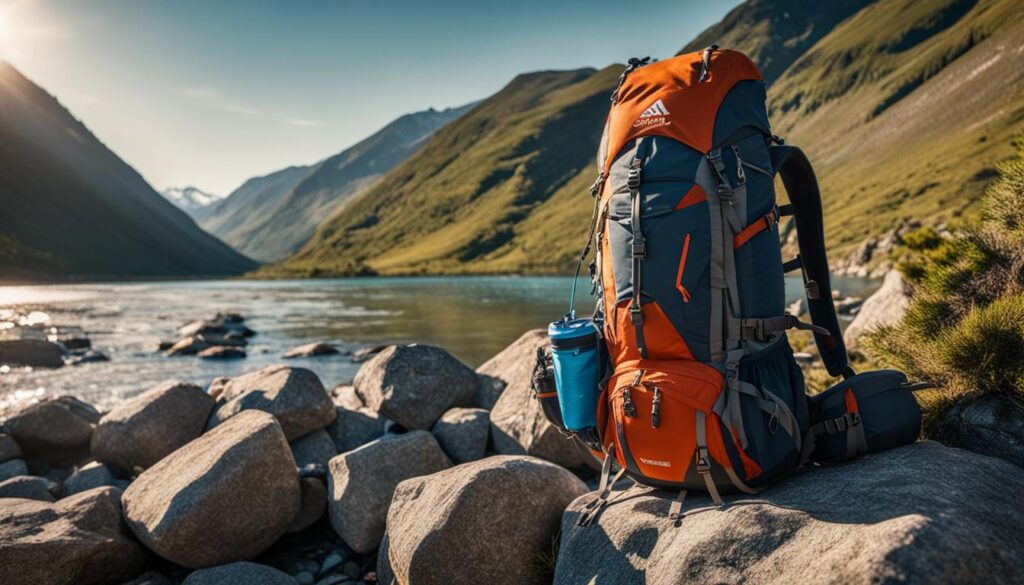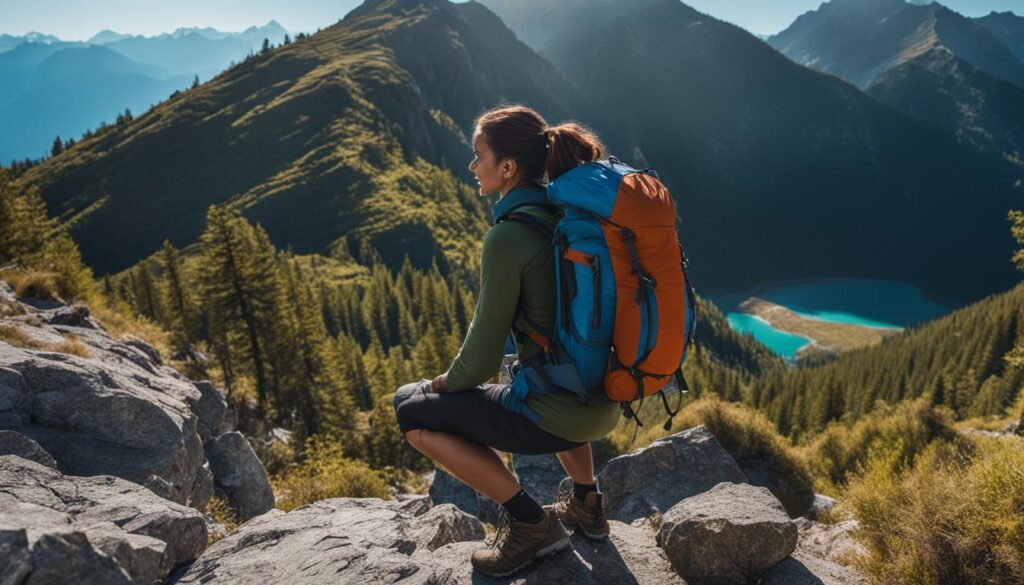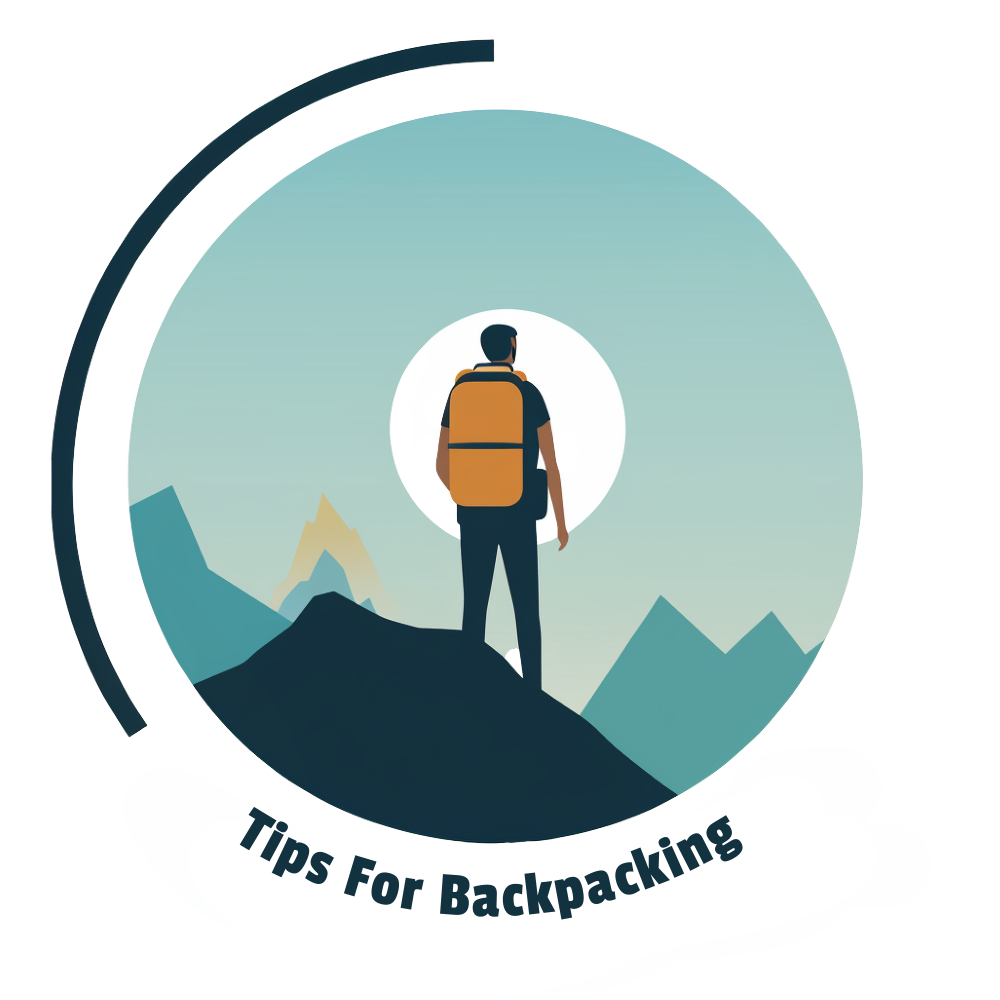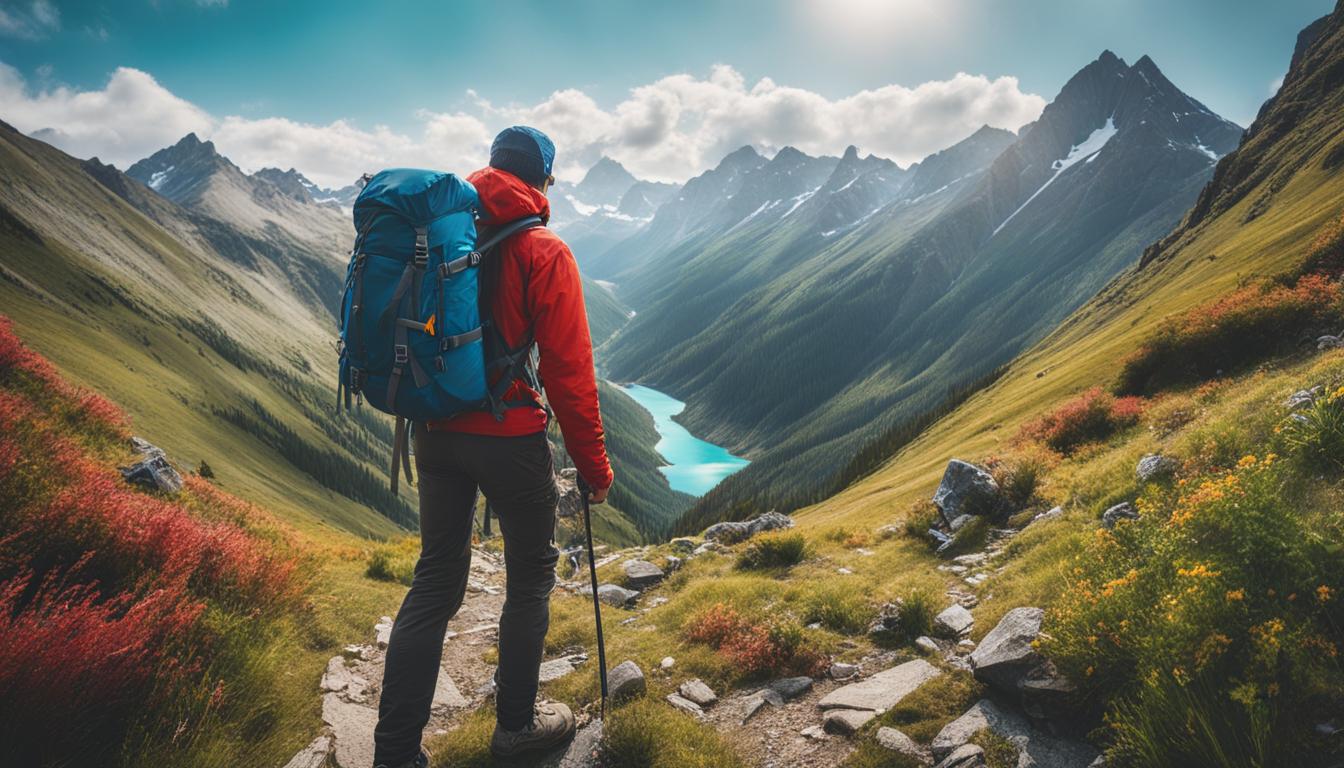As a first-time backpacker, I know how exciting and nerve-wracking it can be to embark on your first adventure. That’s why I’m here to share some essential tips and advice to help you make the most of your backpacking journey. Whether you’re hitting the trails for a weekend getaway or planning a longer expedition, these tips will ensure that you have a safe, enjoyable, and memorable experience.
Key Takeaways:
- Plan your trip and research your destination thoroughly.
- Invest in quality backpacking gear.
- Pack light and only bring essential items.
- Stay organized and use packing cubes.
- Stay hydrated and bring a water filtration system.
Essential Gear for First-Time Backpackers

When embarking on your first backpacking adventure, having the right gear is crucial for a safe and enjoyable trip. Here are some must-have items that every first-time backpacker should consider:
1. Backpack
A sturdy and comfortable backpack is the foundation of any successful backpacking journey. Look for a pack that is durable, water-resistant, and has a sufficient capacity to hold all your gear. Adjustable straps and a padded hip belt are important features for ensuring proper weight distribution and reducing strain on your back.
2. Tent
A reliable and lightweight tent is essential for providing shelter and protection from the elements during your overnight stays. Look for a tent that is easy to set up and pack, with good ventilation to prevent condensation. Consider the size of the tent based on the number of people sharing it and the weather conditions you may encounter.
3. Sleeping Bag
A high-quality sleeping bag is vital for a restful night’s sleep while camping. Choose a bag that is suitable for the expected temperatures and provides enough insulation. Look for features like a hood, draft collar, and zipper draft tube to maximize warmth and comfort.
4. Cooking Equipment
Having the right cooking equipment allows you to prepare hot meals and enjoy a variety of delicious food on your backpacking trip. Consider lightweight options like a compact stove, cookware set, and utensils specifically designed for camping. Don’t forget to pack a water filter or purification tablets to ensure a safe water supply.
5. Clothing and Footwear
Pack clothing that is suitable for the expected weather conditions, including moisture-wicking and quick-drying materials. Layering is key to adjust to changing temperatures. Invest in a good pair of hiking boots or trail shoes that provide ankle support and have a durable, non-slip sole for traversing different terrains.
6. Navigation Tools
Stay on track with a reliable map, compass, and GPS device. Familiarize yourself with the route before setting off and learn how to use these tools effectively. It’s also a good idea to have a backup power source for electronic navigation devices.
7. First Aid Kit
Prepare for any minor injuries or illnesses with a well-stocked first aid kit. Include essentials like bandages, antiseptic wipes, pain relievers, and any necessary medications. Familiarize yourself with basic first aid techniques before your trip.
Remember, the gear you choose should align with your backpacking goals, destination, and personal preferences. Take the time to research and invest in high-quality gear that will stand the test of time and enhance your backpacking experience.
Physical Preparation for Backpacking

When embarking on a backpacking adventure, it is important to be physically prepared to ensure a safe and enjoyable trip. Getting in shape before your journey can greatly enhance your experience in the great outdoors. Here are some tips for backpacking fitness for beginners:
1. Start with Cardiovascular Exercises
Cardiovascular fitness is key when it comes to backpacking. Engage in activities such as jogging, cycling, or swimming to improve your endurance. Aim for at least 30 minutes of moderate-intensity cardio exercises, three to five times a week. Gradually increase the duration and intensity of your workouts to build stamina for long hikes.
2. Strengthen Your Lower Body
Backpacking involves long hours of walking and carrying a heavy pack, which can put strain on your lower body. Incorporate strength training exercises into your routine, focusing on the muscles used during hiking, such as the quadriceps, hamstrings, and calves. Squats, lunges, and step-ups are great exercises to build lower body strength.
3. Don’t Forget Core and Upper Body Strength
While lower body strength is crucial, it’s also important to strengthen your core and upper body. A strong core helps with balance and stability on uneven terrain, while upper body strength is needed for carrying your backpack. Include exercises like planks, push-ups, and shoulder presses to target these areas.
Remember to listen to your body and gradually increase the intensity of your workouts. It’s also a good idea to consult with a fitness professional before starting a new exercise routine. By preparing your body through physical training, you’ll be ready to tackle the challenges and enjoy the breathtaking beauty of the wilderness during your backpacking trip.
Table: Sample Backpacking Fitness Routine
| Exercise | Reps/Sets |
|---|---|
| Jogging | 30 minutes, 3 times a week |
| Cycling | 45 minutes, 2 times a week |
| Swimming | 30 minutes, 2 times a week |
| Squats | 3 sets of 10 reps |
| Lunges | 3 sets of 10 reps per leg |
| Step-ups | 3 sets of 10 reps per leg |
| Planks | 3 sets of 30-second holds |
| Push-ups | 3 sets of 10 reps |
| Shoulder Presses | 3 sets of 10 reps |
What Are Some Essential Tips for First-Time Backpackers?
When embarking on your first backpacking adventure, it’s crucial to have the essential backpacking gear and tips in place. Research the terrain and weather conditions beforehand. Invest in quality gear, such as a durable backpack and lightweight tent. Packing essentials like a first aid kit, water purifier, and navigation tools is essential.
Conclusion
Embarking on your first backpacking trip can be an exciting and rewarding adventure. As a first-time backpacker, it’s important to avoid common mistakes and be well-prepared for your journey. By following these top tips for first-time backpackers, you can ensure a safe and enjoyable experience in the great outdoors.
First and foremost, remember to pack smart. Make a checklist of essential items like a reliable backpack, comfortable shoes, weather-appropriate clothing, and a good sleeping bag. Don’t forget essentials like a first aid kit, water filter, and a map or GPS device to navigate your way during the trip.
In addition to packing smart, having the right gear is essential. Invest in high-quality equipment that is lightweight and durable. Items like a reliable tent, a compact stove, and a water purifier can make a big difference in your overall experience. It’s also worth considering packing multi-purpose gear to save space and weight in your backpack.
Lastly, don’t forget to prioritize your physical fitness. Backpacking involves long hikes and carrying a heavy load, so it’s important to be in good shape. Start preparing well in advance by incorporating regular cardio and strength training exercises into your routine. Gradually increase the intensity and duration of your workouts to build endurance and stamina. Remember, the fitter you are, the more you’ll be able to enjoy the stunning landscapes on your journey.

